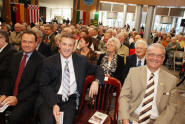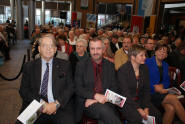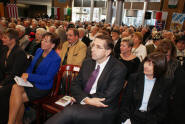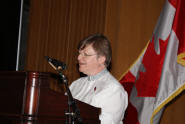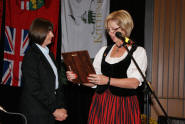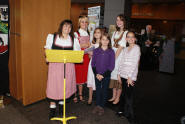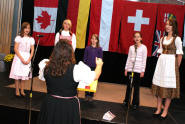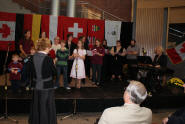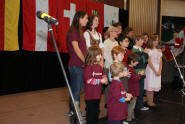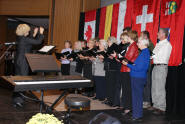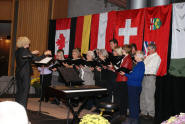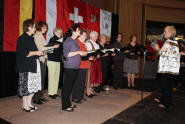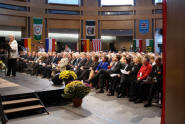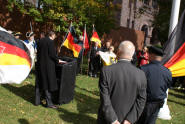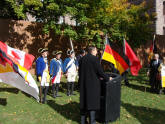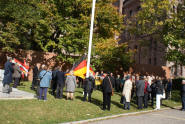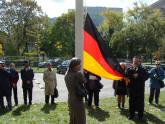|
 If the number of
politicians sending greetings or showing up
in person at an event taking place in our community is any
indication of how well liked the Germans are in this country
then we can only say that our popularity is at an all time high. If the number of
politicians sending greetings or showing up
in person at an event taking place in our community is any
indication of how well liked the Germans are in this country
then we can only say that our popularity is at an all time high.
 |
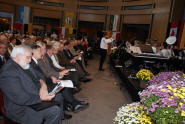 |
| Transylvania
Brass Band under Jeremy Frim |

The German Pioneers Day (one day after Thanksgiving Day) in
Ontario saw its 10th anniversary this year and gave
again a spectacular presentation in the Rotunda of the Kitchener
City Hall.
Ten high ranking politicians and diplomats are
represented in the program booklet and many more showed up and
more were present in the evening at an appreciation dinner in
the Danube Swabian Club, where honours were handed out to the
organizers of this successful event that affords our community a
high profile.
|
Singing the National Hymns |
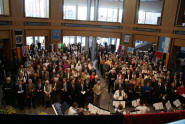 |
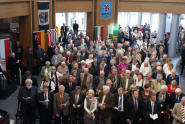 |
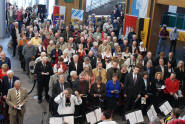 |
| |
|
| The speakers |
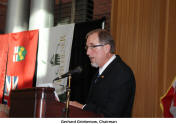 |
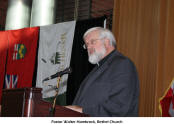 |
| Gerhard Griebenow, Chairman |
Pastor Walter Hambrock,
Bethel Church |
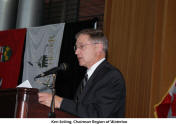 |
 |
| Ken Seiling, Chairman Region
of Waterloo |
Carl Zehr, Mayor of the City
of Kitchener |
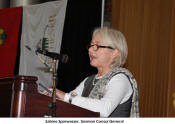 |
 |
| Sabine Sparwasser, German
Consul General |
Ernst Friedel, President
German Canadian Congress (Ontario) |
Part of the celebration commemorating the early German pioneers
in Ontario is the honouring of contributors to the lives of many
during their time. Sometimes it is a living person, sometimes it
is a whole family tree with all its past and present members
that is being honoured.
| Wayne Wettlaufer
honoured & introduced by Toni Bergmeier |
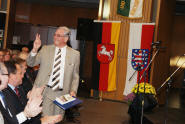 |
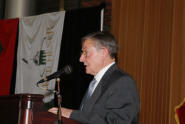 |
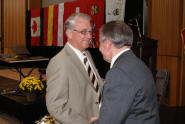 |
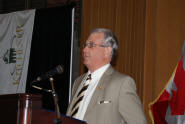 |
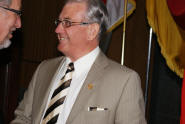 |
 |
This year, appropriately, Wayne Wettlaufer, was at hand to speak
about the Private Members Bill he introduced to the Ontario
Legislature (Bill 28-1999) that affords us today the official
recognition the German pioneers so richly deserve:
|
Honouring of the Huber Family, introduction by
Helene Schramek, presentation by Ernst Friedel |
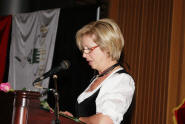 |
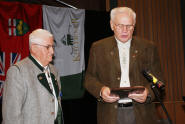 |
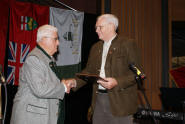 |
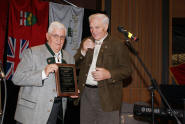 |
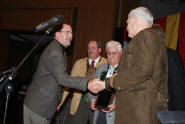 |
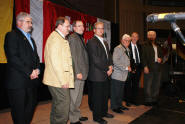 |
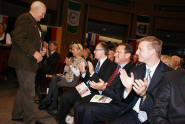 |
Helene Schramek introduced the Huber Family, whose roots lie in
Yugoslavia, came to Canada via Austria and forged with George
Piller, who they met in Montreal, the now famous company.
Pillers sausages and meat products are a staple in Canadian
kitchens for 52 years, employing 750 people in Ontario.
|
Honouring of Paul Tuerr, introduction by Werner
Schlüter, presentation by Ernst Friedel |
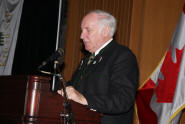 |
 |
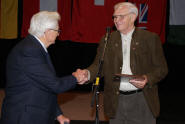 |
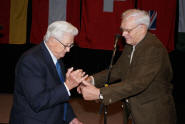 |
 |
 |
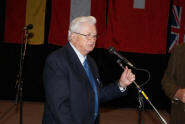 |
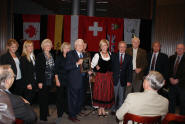 |
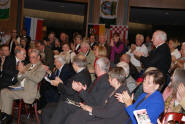 |
Equally outstanding is the contribution Paul Tuerr made to the
community, which Werner Schlüter spoke about in his introduction
of this local entrepreneur. He too hails from Yugoslavia,
studied in Stuttgart, Germany, to be a structural and
architectural engineer. He arrived in Canada in 1948, worked as
a bricklayer and started his own construction company after only
7 month with the help of a loan. And the rest is history. He
truly built communities and his generosity towards activities
that further studies at the Waterloo Centre for German Studies
and towards activities that further German culture, literature
and language is well known. He is also the founder of the
Remembrance Society, which commemorates all innocent victims of
genocide, racism, torture and expulsion.
| Honouring of Bethel Church,
introduction by Harry Drung, presentation by Gerhard
Griebenow |
 |
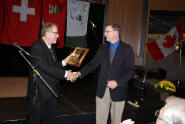 |
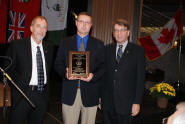 |
A community without spiritual guidance is lost, thus it is
important to acknowledge those that gave the community members
their moral and spiritual strength and guidelines, as Harry
Drung pointed out in his introduction of the church
representative. Just over 60 years ago the Bethel Evangelical
Lutheran Church formed its congregation and still supports a
strong part of the local community.
The same can be said for St. Peter’s Evangelical Lutheran
Church, as Judy Pentaker mentioned when she introduced this
recipient of the Pioneers award. The beginnings of this church
date back to 1859 and in the early days services all were held
in the German language, and added English in the late 1880s.
Many good deeds were performed in the past by this congregation
and to this day missionary activities are a main activity of
this church. The church is a mainstay of the community for 175
years and has very strong support in the now mixed community,
especially the German one.
Throughout the proceedings the Bethel Choirs performed, as did
the children’s choir of the Concordia Language School.
 |
 |
| A presentation to
Paul Tuerr by Stephen Woodworth, M.P. |
...another
presentation to the Bethel Church |
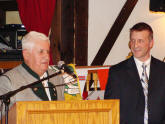 |
 |
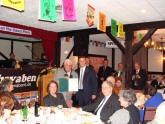 |
| ...and to the
Huber Family |
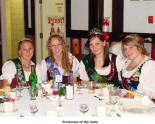 As it was also Oktoberfest at the time of this celebration the
food in the Danube Swabian Club for the appreciation evening was
decidedly leaning towards Bavarian foods, which everyone partook
in with great delight. As it was also Oktoberfest at the time of this celebration the
food in the Danube Swabian Club for the appreciation evening was
decidedly leaning towards Bavarian foods, which everyone partook
in with great delight.
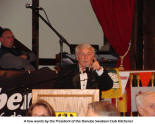 More speeches and congratulatory remarks
and plaques were handed out and everyone was very happy having
been validated for a job well done! More speeches and congratulatory remarks
and plaques were handed out and everyone was very happy having
been validated for a job well done!
 |
| Always stepping up to the
plate: Werner Schlüter, Helene Schramek, Gerhard
Griebenow, Ernst Friedel |
We add our thanks and congratulations to all past and present
who contribute so much to our cultural heritage.
German Pioneers Day at
Queen's Park, Toronto
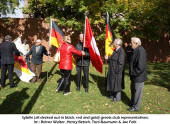 In Toronto Pioneers Day was named Flag Raising Day. This year
the proceedings were organized by Christian Klein, President of
the Historical Society of Mecklenburg Upper Canada instead of
the German Canadian Consulate. In Toronto Pioneers Day was named Flag Raising Day. This year
the proceedings were organized by Christian Klein, President of
the Historical Society of Mecklenburg Upper Canada instead of
the German Canadian Consulate.
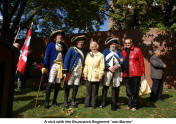 True to his post he brought a
colourful historical element to the event, namely members of the
recreated Brunswick Regiment "von Barner". We heard from its
president some of the colourful history surrounding this
regiment. True to his post he brought a
colourful historical element to the event, namely members of the
recreated Brunswick Regiment "von Barner". We heard from its
president some of the colourful history surrounding this
regiment.
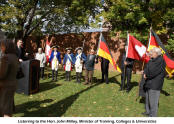 The Hon. Mr. John Milloy, Minister of Training, Colleges and
Universities led elloqunatly and with great enthusiasm .through
the program. He hails from Kitchener and is very familiar with
the German culture. The Hon. Mr. John Milloy, Minister of Training, Colleges and
Universities led elloqunatly and with great enthusiasm .through
the program. He hails from Kitchener and is very familiar with
the German culture.
Many local German Canadian organizations had sent
representatives who all wanted their moment at the mike. Thus
the proceedings were perhaps a bit too long in the unsheltered
outside flag pole location, with a cold wind chasing leaves on
the ground and clouds in the sky.
| The Speakers |
 |
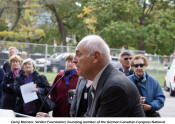 |
| The Hon. John Milloy,
Minister of Training, Colleges & Universities |
Gerry Meinzer, Schiller
Foundation, founding member of the German Canadian
Congress National |
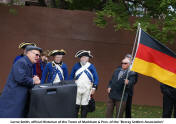 |
 |
| Lorne Smith, official
Historian of the Town of Markham & Pres. of the "Berczy
Settlers Association" |
Claus Reuter, Brunswick
Regiment "von Barner" (recreated) |
 |
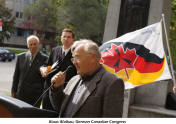 |
| Christian Klein, President
of the Historical Society of Mecklenburg Upper Canada |
Klaus Walkau, German
Canadian Congress (Ontario) |
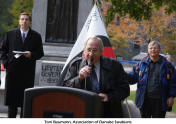 |
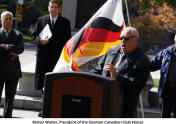 |
| Toni Baumann, Association of
Danube Swabians |
Reiner Walter, President of
the German Canadian Club Hansa |
| |
|
 |
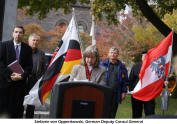 |
| Alex Roman for Frank Klees |
Stefanie von Oppenkowski,
German Deputy Consul General |
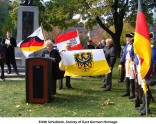 |
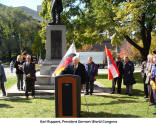 |
| Edith Schulbeck, Society of
East German Heritage |
Karl Ruppert, President
German World Congress |
Deputy Consul General Mrs. Stefanie von Oppenkowski was the
first to acknowledge the history of Germans in Ontario. She was
followed by Gerry Meinzer, Founder of the German Canadian
Congress, now representing the Schiller Foundation. Lorne Smith,
Markham’s official historian made a few educated points on the
subject at hand, Christian Klein also had interesting data about
this city and our ancestors involvement, as did Rev., Pastor
Schweter, of the First Lutheran Church on Bond Street, Toronto,
was built in 1898, the congregation existed since 1851.
The German Canadian Congress had sent Klaus Walkau, the German
Language Schools were represented by Mrs. Hildegard Schieweck,
Anton Baumann represented the Danube Swabians, Rainer Walter the
Hansa Haus, Karl Ruppert the German World Congress and other
speakers that came forward impromptu added to the list.
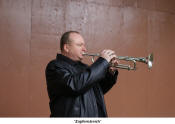 When the trumpet signal was played (Give us a place to stand and
a Place to grow) the anthems were sung and the flag was raised
the upturned faces shone with pride, grateful for the highly
overdue acknowledgement, as was mentioned repeatedly in the
speeches. When the trumpet signal was played (Give us a place to stand and
a Place to grow) the anthems were sung and the flag was raised
the upturned faces shone with pride, grateful for the highly
overdue acknowledgement, as was mentioned repeatedly in the
speeches.
Hard to believe that 20 years have gone by since Toronto and
Frankfurt became sister cities. We were in our first year of
publication and I distinctly recall that the big folk fest on
Philip Nathan Square included a German jazz band that had
represented its country many times before on other such
missions. Here in Toronto however the general German Canadian
public that had come had turned its nose up because jazz was not
German. We all know where that short sighted point of view comes
from.
 There was no danger of this happening again this year at the 20th
anniversary get-together at Toronto’s City Hall. There was a
jazz band; however, this was not a folk fest, more like a
gathering of diplomats, and bureaucrats with a sprinkling of
media types and academia, all milling about a fabulous buffet of
Canadian delicacies: Smoked salmon, tender nearly raw roast
beef, huge shrimp and all sorts of fruit and cheese. We wonder
whose budget went into the red numbers for this spread, not that
it matters at this point. What are a few more numbers when
things are going so well? There was no danger of this happening again this year at the 20th
anniversary get-together at Toronto’s City Hall. There was a
jazz band; however, this was not a folk fest, more like a
gathering of diplomats, and bureaucrats with a sprinkling of
media types and academia, all milling about a fabulous buffet of
Canadian delicacies: Smoked salmon, tender nearly raw roast
beef, huge shrimp and all sorts of fruit and cheese. We wonder
whose budget went into the red numbers for this spread, not that
it matters at this point. What are a few more numbers when
things are going so well?
 Besides, it was all well guarded, by
the Royal Mounted Police, no less! It turned out that it was a
"German" Mountie, Terry Russel, whose mother and grandmother
were German. Besides, it was all well guarded, by
the Royal Mounted Police, no less! It turned out that it was a
"German" Mountie, Terry Russel, whose mother and grandmother
were German.
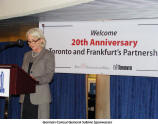 Germany’s newest Consul General Sabine Sparwasser made the first
introductions and then Mayor Miller pirouetted on stage, all
elegant and suave, very likable actually, and spoke of the last
20 years like a love affair. Germany’s newest Consul General Sabine Sparwasser made the first
introductions and then Mayor Miller pirouetted on stage, all
elegant and suave, very likable actually, and spoke of the last
20 years like a love affair.
 |
 |
| Toronto's Mayor David Miller |
Frankfurt's Mayor
Dr. h.c. Petra Roth |
Then Dr. Petra Roth, Lord Mayor of Frankfurt (Oberbürgermeister
in German) walked on the stage in a perfectly fitted suit and
high heels. She too reiterated all the wonderful things the 2
cities had done together and are going to do in the future where
they would later sit back, retired from
 politics, and
congratulate each other on their successful actions. What
exactly the partnership had accomplished other then getting to
know one another and liking one another, which was openly
visible (the "my dear colleague"s were flying around a lot) was
not quite clear, but that is where academia comes in. politics, and
congratulate each other on their successful actions. What
exactly the partnership had accomplished other then getting to
know one another and liking one another, which was openly
visible (the "my dear colleague"s were flying around a lot) was
not quite clear, but that is where academia comes in.
 They plan
and plot projects that benefit the future of both our countries
through education. So far it was discovered that the two cities
have a lot in common, in fact are not dissimilar in their
stature towards the rest of their countries, their cultural make
up and ethnicity. Both play a similar role and have similar
importance to the rest of the country. They plan
and plot projects that benefit the future of both our countries
through education. So far it was discovered that the two cities
have a lot in common, in fact are not dissimilar in their
stature towards the rest of their countries, their cultural make
up and ethnicity. Both play a similar role and have similar
importance to the rest of the country.
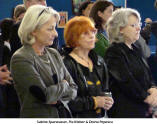 So, here in Toronto Germany and things German are held in the
highest esteem. From here on there cannot be anymore doubt about
the close relationship between out cultures. The past is over.
The future is in the making. Well done to all of us! So, here in Toronto Germany and things German are held in the
highest esteem. From here on there cannot be anymore doubt about
the close relationship between out cultures. The past is over.
The future is in the making. Well done to all of us!
Until next time
Sybille Forster-Rentmeister
|
-
German Pioneers Day in Kitchener
-
-
-
-
German Pioneers Day at Queen's
Park Toronto
-
|








